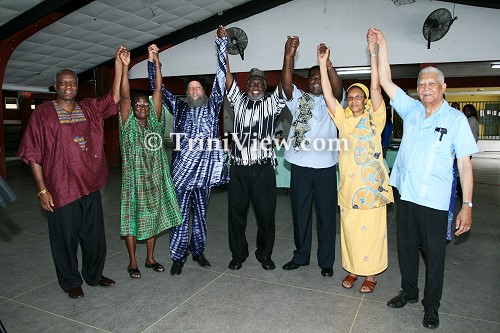 Members of the Caribbean Historical Society with panelists
Members of the Caribbean Historical Society with panelists
TriniView.com Reporters
Event Date: July 01, 2007
Posted: July 10, 2007
The Caribbean Historical Society (C.H.S.) held a one day seminar on July 1, 2007, at the SWWTU Hall in Port of Spain, in commemoration of the 200th anniversary of the abolition of the trans-Atlantic slave trade. The seminar titled "A Spirit Undaunted" takes the same name as the book launched by the C.H.S. recently to address the abolition process.
Leopold Edwards, Trans-Africa chairman of the Washington Metropolitan Area, spoke on the topic "The Legacy of the Trans-Atlantic Slave Trade and Slavery." He highlighted mental slavery as one of the most enduring effects of slavery and criticized the view that it happened so long ago that it was no longer worthy of discussion. Mr. Edwards was critical of globalisation which he described as serving a few, quoting a United Nations report that shows that the upper ten percent in the world controls ninety-four percent of the world's resources.
Dr. Ikael Tafari, chairman of the Pan African Commission of Barbados spoke on the topic "The Abolition of the Trans-Atlantic Slave Trade and Slavery." Was it due to the abolitionist in Britain or economic factors?" Dr. Tafari made mention of the movement in Caribbean historiography to move away from terms such as "slave trade" since no slaves were brought from Africa, only captive Africans. He pointed out that the abolitionists, such as William Wilberforce, in distinguishing between emancipation and abolition, were in favour of abolition but not emancipation.
Citing Eric William's book "Capitalism and Slavery", Dr. Tafari stated that behind the humanitarian moves to abolish slavery were economic motives. Tafari pointed out that although slavery and the slave trade had influenced industrial capitalism, the old slave relations became archaic.
Apart from this, Dr. Tafari emphasized that the contributions of enslaved Africans in the abolition process has been left out and he highlighted the importance of various historical figures such as Bussa, Nanny Griggs and Toussaint L'Overture who were a part of the African resistance to slavery.
Nyahuma Obika, president of the Caribbean Historical Society, spoke on the "Impact of the Haitian Revolution and the Abolition of the Trans-Atlantic Slave Trade and Slavery." Obika argued that if the 200th anniversary of the abolition of the slave trade was to have any meaning, it is incumbent on researchers and historians today to discard the past and current theories of Africa's duplicity and to see this point of view as a clever attempt to exonerate Europeans as the architects of this scandalous crime against humanity. "The failure of contemporary historical analysis to acknowledge the relentless resistance to European attempts at conquering our lands and peoples smacks of the same disrespect and denial of the capacity of the African to govern his own affairs," he said.
Obika highlighted the tremendous feat of Haiti freeing itself and establishing itself as an independent Black Republic, and the implications of such. He pointed out that Haiti assisted Mexico in their war of independence as well as South American liberator, Simon Bolivar, in his struggles against Spanish colonialism, leading to the abolishment of slavery in these regions. In addition, Obika explained that Haiti inspired revolts against slavery all over the Caribbean.
Following Haiti's successful independence movement, Obika informed the audience that Haiti was blockaded and forced to pay France an indemnity of independence totaling 150 million francs. "The paying of this infamous debt crippled the economy of this nation and contributed to the depletion of the forest reserves in Haiti," he said. Obika further remarked that the removal of the Haitian President, Jean Bertrand Aristide was because of his demands for repayment by France of today's equivalent of the sum that was paid to France.
In the absence of Aiyegoro Ome, Jawara Mobota spoke in his place on the topic, "The Question of Africa's Role in the Trans-Atlantic Slave Trade and Slavery." He challenged the notion that Africans enslaved other Africans, saying that it implied that the majority of Africans participated in the Slave Trade. Though acknowledging that some Africans participated in the enslavement process, he highlighted the resistance of Africans on the continent as exemplified by Queen Nzinga and the Ndongo people. Mobota went on to outline in depth the various defensive, offensive and protective strategies employed by Africans in their resistance to European incursions and enslavement.
Makandal Daaga, chief servant of NJAC, addressed the gathering and explained that, "This seminar was forced by the attitude of the people who brought us here." He criticized the glorification of Wilberforce in ending slavery as shown by the movie Amazing Grace and the 200 mile journey in England to honor Wilberforce and his clan for abolishing British chattel slavery. In addition, Daaga noted that the present "in thing" is to "help Africa" and declared that European powers are not going to give up resources of the developing world. Daaga mentioned that the cost of the seminar would have kept some persons away, and pledged to make video recordings available to the public for as cheaply as possible.
Caribbean Historical Society's 'A Spirit Undaunted' Seminar in pictures:
www.triniview.com/gallery/main.php?g2_itemId=187662
Homepage | NJAC | Photo Gallery
|
